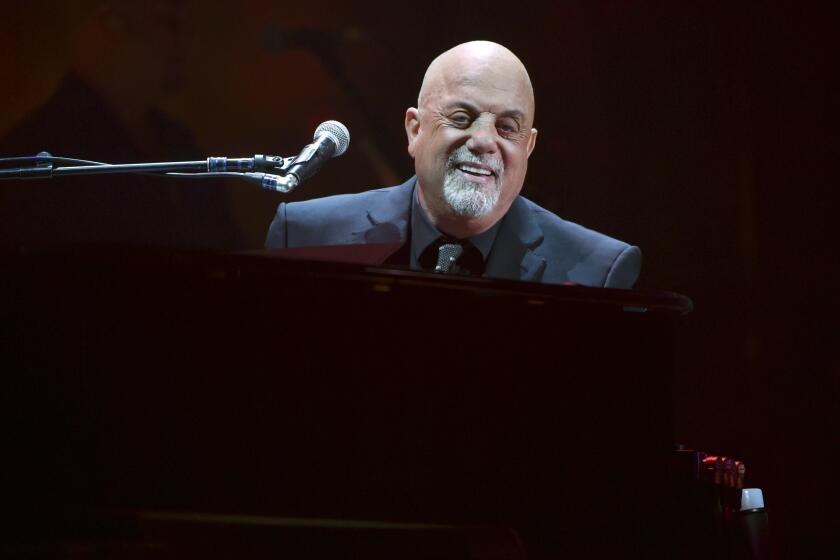Chained Melodies
Finding shortcomings in Ani DiFranco’s exceptional concert Friday at UC Irvine’s Bren Events Center may be a bit like complaining of anatomical incompleteness in the Venus de Milo.
This self-professed “folksinger,” known as much for her self-sufficient, cottage-industry approach to the music business as for the music she makes, stepped naturally, like a platform-booted Cinderella, into the shoes of an arena-rocker. Like all great arena-rockers, she was able to fill a large space with the scale of her music and the force of her passion and personality, making the basketball court’s echoing acoustics seem almost (but not quite) irrelevant.
Even with footwear that might suffice for a mob hit man’s corpse-disposal needs if no concrete were handy, DiFranco moved with a bouncy, rag-doll levitation born of infectious enthusiasm. Wearing a dancer’s short dress over braided leggings, she struck guitar-hero poses worthy of Rancid or Metallica and made them seem natural; she charmed with her giggling gift of gab, sang commandingly--hitting whatever note of playfulness, ardor or steely acerbity the moment demanded--and benefited from the support of a bass-drums-keyboards trio that offered first-rate musicianship and vocal harmonies.
All in all, it was hard not to imagine this 27-year-old, barnstorm-seasoned veteran of the do-it-yourself movement stomping onward and upward in the footsteps of Bob Dylan, Bruce Springsteen, John Mellencamp, Chrissie Hynde . . . name your riveting, song-oriented, big-rock star presence.
But something was missing. All the truly great rockers command music’s greatest seductive power: the pull of grabbing melody. DiFranco doesn’t. She lacks the ability--or maybe it’s just the experience or the willingness--to harness her effusive, rhythmically probing flights of language and let them be carried by, and inevitably overshadowed by, the force of indelible tunefulness.
Famed for her slightly dizzy between-songs extemporizing (she is one of those live wires charming enough to chuckle incessantly at her own remarks and get away with it), DiFranco may be too brilliant a talker for her own good. Most of her music is steeped in the free-flowing cadences of speech rather than the more formal (and, for me, more eloquent) alternate language of melody.
Which is not to accuse her of a tin ear. In snippets, DiFranco is capable of melodic grace, but she doesn’t seem completely comfortable with it. Take the refrain of “As Is,” from her fairly catchy new album, “Little Plastic Castle.” She delivered it with an exaggerated airiness and gave the phrasing a contorted spin that amounted to a satire on her own tune’s prettiness.
DiFranco’s performance rode frequently on clipped, nervous guitar rhythms that evoked a cartoon mouse making its way through cat-infested territory. She got funky with her own “Shameless” and an encore cover of Stevie Wonder’s “I Wish,” which was aided by a horn trio from the Rebirth Brass Band, her rhythmically cooking opening act. Having delightfully given rein to her rhythmic jones, here’s hoping that someday she will be as indulgent of her inner Joni. If she can, her cottage industry will probably become a skyscraper.
The arena echo did intrude early in DiFranco’s 100-minute show; it seemed that such a verbally centered artist had made a mistake by stepping out of the clubs and small theaters and flinging her rush of words to the unkind concrete.
But her quieter, more measured numbers registered well, and soon DiFranco was pulling off grand arena-goddess moves like the keening, over-the-top woman-scorned outrage of “Done Wrong” (“How could you do nothing when I’m doing my best? / How could you take almost everything and come back for the rest?”). The resounding crash and expansive, organ-levitated heartland twang-rock of “Every State Line” (an “Easy Rider”-like tale of her scuffling days as a freak-flag-flying, shaven-headed alternative life-stylist on the road in Muskogeeville, USA) would have done Tom Petty and the Heartbreakers proud.
*
DiFranco was commanding, in starker modes, with the as-yet unreleased “Come Away,” a dark, aching, torchy plea that offered affecting harmonies and, if the arena acoustics didn’t deceive, a glimpse of what it’s like to be in a romantic triangle in which drug addiction (or some other self-destructive obsession) is the victorious rival.
Another source of her potential greatness is her ability to work on a social, as well as a personal, scale: “ ‘Tis of Thee,” the set’s other new song, was a deeply pessimistic assessment of the state of the nation’s soul. In it, DiFranco, who is so transported by the power and pleasure of lively discourse, was benumbed (except when outraged) by the stupidity and hostility that prevail in America’s talk-show agora. “. . . Turn off the sound / We’ll never live long enough to undo everything they’ve done to you,” DiFranco spat, assessing the damage done when the better angels of our nature are wing-clipped by televised freak shows.
Even if she lacks the first-rate ear for melody needed to make a mass impact, DiFranco has something special with her ongoing, diaristic song of herself. She is willing to divulge the contradictions in her nature, even at the risk of looking bad.
In fact, she emphasized those contradictions by segueing from “Letter to a John,” in which she casts singing for money as the most mercenary sort of human connection, to “Pulse,” which reaches for the pure, self-sacrificing essence of deepest love. Or by following “Swan Dive,” in which she paints herself as a heroic risk-taker for the sake of art and love, with “Gravel” (one of her catchier numbers), a portrait of the artist as one of the most wretchedly dysfunctional schmoes ever to fall for a creep.
That’s why DiFranco is worth hearing out as she goes through her goldfish-in-a-bowl phase of first fame (she pictures herself as such on the cover of “Little Plastic Castle”). Unless a songwriter is going to come up with something approaching the caliber of Neil Young’s “Mr. Soul,” songs about how fame is messing with her mind just play to the insipid celebrity culture we’re stuck in. And DiFranco’s watching-them-watching-me songs, like the jaunty “Little Plastic Castle” and the not-performed “Glass House,” don’t qualify.
But it’s DiFranco’s diary, and if this vital, full-blooded presence on the pop scene is brave or needy enough to give it to us uncensored, we’d be fools to reject her because not every page is resonant or profound.
More to Read
The biggest entertainment stories
Get our big stories about Hollywood, film, television, music, arts, culture and more right in your inbox as soon as they publish.
You may occasionally receive promotional content from the Los Angeles Times.







